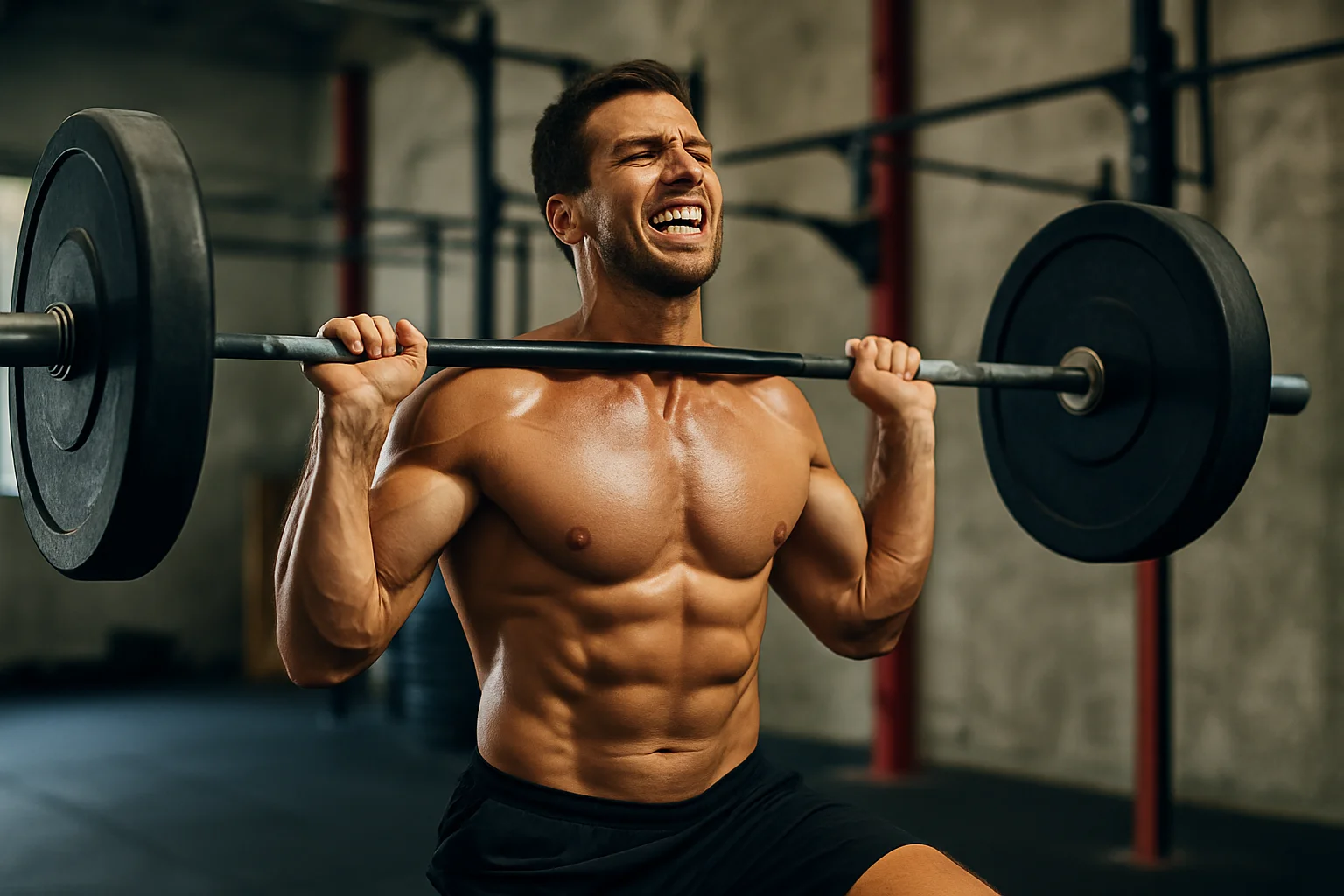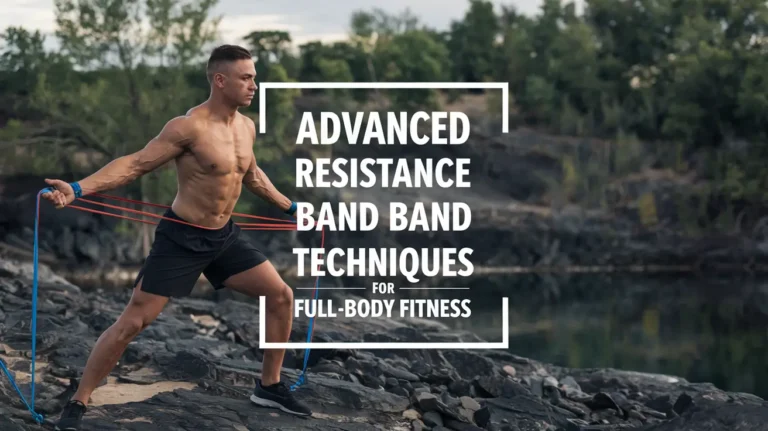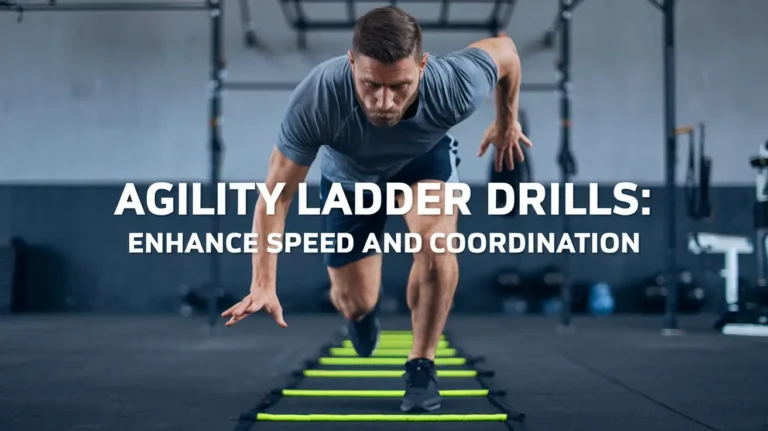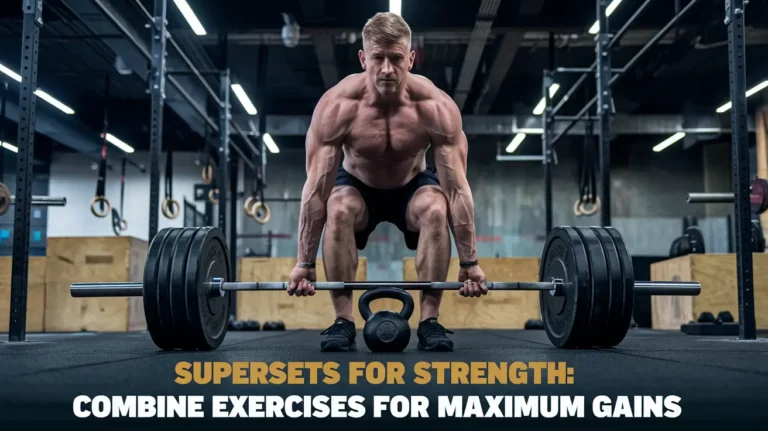Our quest for fitness never stops. Whether you’re a pro at the gym or just starting, resistance bands are key. They help us build strength, improve flexibility, and boost our overall health.
Let’s explore advanced techniques with resistance bands to reach our full-body potential.
Key Takeaways about Advanced Resistance Band Training
- Resistance bands offer versatile and effective full-body workouts without relying on gravity for resistance.
- They allow for exercises at various angles, challenging muscles in different directions.
- Resistance bands are ideal for accessory exercises, adding variety to routines and reducing joint stress compared to heavy barbells.
- The instability of chaos push-ups activates the smaller stabilizers and improves proprioception.
- Bent-over rear delt flyes strengthen the rhomboids and traps, assisting upper back bracing for the deadlift.
The Benefits of Resistance Band Training
Resistance band training is a flexible and easy way to stay fit. It’s great for everyone, no matter your fitness level. These tools are not only enhance muscle strength, but also improve flexibility and mobility and increase cardiovascular endurance.
Enhancing Muscle Strength
Resistance bands work by creating constant tension. This helps grow and strengthen muscles. Studies show they’re as good as weights for building muscle.
Doctors use them in rehab to help patients recover and regain strength. They’re a key part of physical therapy.
Improving Flexibility and Mobility
Resistance bands let you move more freely. This is especially good for older adults. It helps keep muscles strong and reduces fall risks.
They’re great for all fitness levels. You can do different exercises to work out different muscles.
Increasing Cardiovascular Endurance
Using resistance bands in HIIT routines is a great cardio workout. It raises your heart rate and boosts your endurance. This makes them perfect for Bodyweight Exercises and Portable Fitness Equipment.
“Resistance bands are highlighted as a tool suitable for beginners and are deemed ideal for at-home and travel workouts.”
Resistance bands are powerful for any fitness plan. They work on many muscles, offer constant tension, and come in various intensities. They’re a smart choice for anyone wanting to get stronger, more flexible, or improve their heart health.
Getting Started with Resistance Bands
Resistance bands are a great and affordable way to work out at home or while recovering from an injury. It’s important to pick the right band and follow safety tips to get the most out of them without getting hurt.
Choosing the Right Resistance Band
Resistance bands come in different strengths for everyone, from beginners to pros. Choose a band that’s just right for you, so you can work out without hurting yourself. Start with a lighter band and get stronger before moving to a harder one.
- Loop bands, tube bands with handles, and therapy bands are popular options for resistance band training.
- Resistance band exercises target various muscle groups, including quads, glutes, hamstrings, shoulders, back, chest, triceps, biceps, and more.
- The variation in resistance levels allows for progressive overload as users get stronger.
Safety Tips for Resistance Band Training
When using resistance bands, safety comes first. Make sure you’re using them right to avoid injuries and get the most out of your workout.
- Always check your bands for any wear or damage before using them.
- Make sure the attachments are secure to avoid accidents.
- Do a warm-up to prevent injuries and get ready for your workout.
- Keep the right form to work the right muscles.
- Change the band’s resistance often to keep your workouts challenging.
By picking the right band and following these tips, you’ll be ready to enjoy the benefits of resistance band training for your workouts or recovery.
Advanced Techniques for Upper Body Workouts
Using advanced resistance band techniques can boost your upper body strength and muscle. These exercises focus on the shoulders, back, and arms. They also improve stability, balance, and Muscle Building.
Band Pull-Aparts for Shoulder Strength
The Band Pull-Apart is a top exercise for the upper body. It targets muscles between the shoulder blades, enhancing posture and back strength. Stand with your feet apart, holding the band in front of your chest.
Keep your arms straight and pull the band apart, squeezing your shoulder blades. Then, return to the start.
Overhead Press for Deltoids
The Overhead Press is great for the deltoids. It strengthens the shoulders and improves their shape. Stand with your feet apart, the band under your feet.
Grip the band ends and press your arms up, extending your elbows. Lower the band slowly, feeling the tension in your shoulders.
Adding the Band Pull-Apart and Overhead Press to your routine can enhance Muscle Building. You’ll get a strong and balanced upper body.
“Resistance bands are a versatile and effective tool for targeting the upper body muscles, allowing for progressive overload and unique movement patterns.”
Lower Body Resistance Band Drills
Resistance band training is great for strengthening and toning the lower body. It includes exercises like squats and lateral band walks. These help build muscle, improve flexibility, and boost lower body fitness.
These drills are also good for those who want to reduce knee stress and improve stability.
Squats with Resistance Bands
The Spanish Squat is a game-changer. It lets us do deeper squats safely and effectively. Adding a resistance band around the thighs works the quads harder, boosting strength and power.
Lateral Band Walks for Hip Strength
Lateral band walks are great for strengthening the hips and improving stability. By walking sideways with tension in the band, we target the hip abductors. This helps build a strong base for better balance and mobility.
This exercise is perfect for those wanting to improve their lower body Strength Training and Flexibility Training.
| Exercise | Sets | Reps | Benefits |
|---|---|---|---|
| Spanish Squat | 3 | 12-15 | Targets quads, reduces knee stress |
| Lateral Band Walks | 3 | 6 each side | Strengthens hip abductors, improves stability |
Start with a light resistance band and get tougher as you get better. Always check with a healthcare pro before starting any new workout. Adding these drills to your routine can unlock your lower body’s full potential. You’ll see better strength, flexibility, and overall health.
“Resistance bands are a versatile and effective tool for targeting the lower body. By incorporating exercises like squats and lateral walks, we can build strength, improve stability, and reduce the risk of injury.”
Core Engagement with Resistance Bands
Adding resistance band exercises to your routine can change the game for a strong core. These bands make core movements harder, working your abs in new ways. They also boost your overall strength and stability.
Seated Band Twist for Obliques
The Seated Band Twist targets your obliques. Sit on the floor with your legs out, holding a band tight between your hands. Twist your body from side to side, feeling your obliques work with each twist. This exercise strengthens your obliques, boosts rotational power, and improves core stability.
Plank with Resistance Band Resists
Adding a resistance band to a plank makes it more challenging. Loop the band around your upper back or shoulders. Hold the plank, resisting the band’s pull with your abs. This version tests your core’s ability to stay stable and strong under extra resistance.
| Exercise | Strength Training | Hypertrophy | Endurance | Power |
|---|---|---|---|---|
| Seated Band Twist | 3-4 sets, 10-12 reps per side | 3-4 sets, 12-15 reps per side | 2-3 sets, 20-25+ reps per side | 3-4 sets, 8-10 reps per side |
| Plank with Resistance Band Resists | 3-4 sets, 6-8 reps per side | 3-4 sets, 8-12 reps per side | 2-3 sets, 15-20+ reps per side | 3-4 sets, 4-6 reps per side |
By adding these Bodyweight Exercises with resistance bands, you’ll challenge your core muscles. You’ll also see better Muscle Building and functional strength. Regular practice will boost your core stability, posture, and athletic performance.
Full-Body Resistance Band Routines
Resistance band workouts are great for staying fit at home or on the move. They offer a full-body workout that’s both effective and easy to do. This makes them perfect for anyone looking to boost their fitness.
Circuit Training: Combining Multiple Bands
Using a resistance band circuit workout is a smart way to work out all major muscle groups. It involves doing a series of exercises with different band levels. This 20-minute routine can include band thrusters, rows, and squats, targeting the upper, lower body, and core.
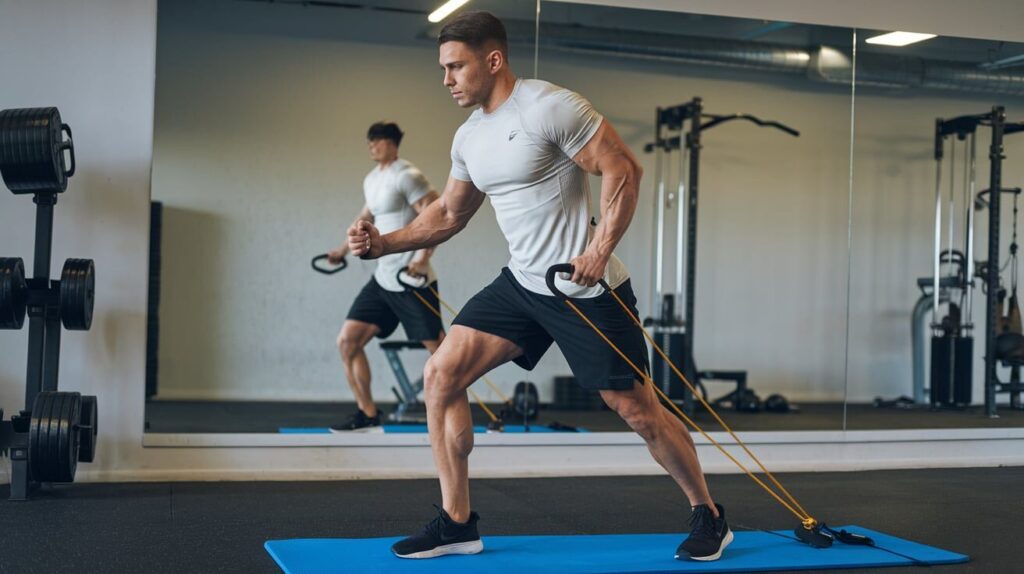
Plyometric Movements with Bands
Plyometric exercises add power and explosiveness to our workouts. Band-assisted broad jumps, for example, increase force production and are easier on the joints. These movements strengthen us and enhance our athletic performance.
Resistance band routines are perfect for quick Home Workouts or keeping fit while Travel Fitness. By mixing bands and adding plyometric exercises, we get full-body workouts. These routines challenge us from head to toe and help us achieve our fitness goals.
Creative Exercises to Challenge Muscles
Resistance training needs variety to keep muscles challenged and avoid plateaus. Resistance bands are versatile and creative for targeting muscles in unique ways. The Resistance Band Clamshell and the Single-Leg Deadlift with Band Support are great examples.
Resistance Band Clamshells for Glutes
The Resistance Band Clamshell is a simple yet effective exercise for the glutes. Loop a resistance band around your thighs and open your knees against the band’s resistance. This targets the gluteal muscles in a way traditional exercises can’t.
This focused effort on the glutes can improve overall Strength Training and muscle balance. It leads to more balanced and powerful movements.
Single-Leg Deadlift with Band Support
The Single-Leg Deadlift with Band Support adds an extra challenge. Hold a resistance band between your legs and do a single-leg deadlift. This engages your core, improves balance, and builds unilateral strength.
This exercise targets the posterior chain and requires stabilization and coordination. It enhances our overall Workout Variety and functional fitness.
Adding these creative resistance band exercises to our routine can help us break out of our comfort zones. They target specific muscle groups and continuously challenge our bodies in new ways. By exploring resistance bands, we can add fresh Workout Variety and effective Strength Training to our fitness journey.
“Resistance band training has become a game-changer in my fitness routine. The variety of exercises and the ability to target specific muscle groups have really taken my workouts to the next level.”
Incorporating Resistance Bands in Pilates
Resistance bands can elevate your Pilates practice, adding a new challenge. They engage your muscles in ways traditional Pilates doesn’t. By using these tools, we can unlock advanced Pilates movements and improve our core stability for a more balanced workout.
Advanced Pilates Moves with Bands
Pilates fans can try various band-assisted exercises to boost their practice. The Hundred, a classic move, becomes more challenging with band resistance. The Teaser, which needs core strength and control, gets harder with bands around our thighs or ankles.
Enhancing Core Stability in Pilates
Resistance bands also help build strong core strength in Pilates. Adding bands to core-focused moves like the Plank or Side Plank increases muscle engagement. This boosts our body control and flexibility training in Pilates.
By adding resistance bands to our Pilates, we open up new fitness possibilities. We get better muscle activation and core stability. This lets us reach new heights in our Pilates practice, achieving a stronger, more flexible, and balanced body.
“Resistance bands can transform our Pilates practice, offering new challenges and unlocking greater muscle engagement. With their versatility, we can explore advanced techniques and build core strength like never before.”
Resistance Bands for Functional Training
Resistance bands are great for functional training. They let us do exercises that feel like real-life activities. This helps us get stronger, move better, and stay balanced.
They’re also great for fixing injuries and preventing new ones. The bands make our muscles work harder, which helps us stay stable.
Real-Life Movement Simulation
Resistance bands help us do exercises that feel like everyday tasks. We can work on pushing, pulling, and moving in different ways. This strengthens the muscles we use in daily life.
For example, they help us carry heavy bags or climb stairs easily. It’s all about getting stronger in a way that matters.
Balance and Coordination Improvements
Resistance bands do more than just build strength. They also improve our balance and coordination. The bands make it harder to stay steady, which helps our muscles learn to work together better.
This makes us more aware of our body’s position and movements. It’s like a workout for our sense of balance. Using Portable Fitness Equipment like this can help prevent injuries too.
| Resistance Band Types | Key Features | Resistance Range |
|---|---|---|
| Loop Bands | Comfortable, no budging during workouts, multiple resistance levels per set | Light (15-25 lbs), Medium (25-35 lbs), Heavy (40-50 lbs) |
| Tube Bands with Handles | Versatile for full-body workouts, similar to using dumbbells and cables | Varies by brand and model |
| Flat Bands | Excellent for mobility training, stretching, and physical therapy | Varies by brand and model |
| Figure 8 Bands | Target muscles from various angles, aid in improving stability during lateral exercises | Varies by brand and model |
There are many types of resistance bands, each for different exercises. Whether you’re looking for something versatile or specific, there’s a band for you. They help us reach our fitness goals and support our health, all while being easy to use anywhere.
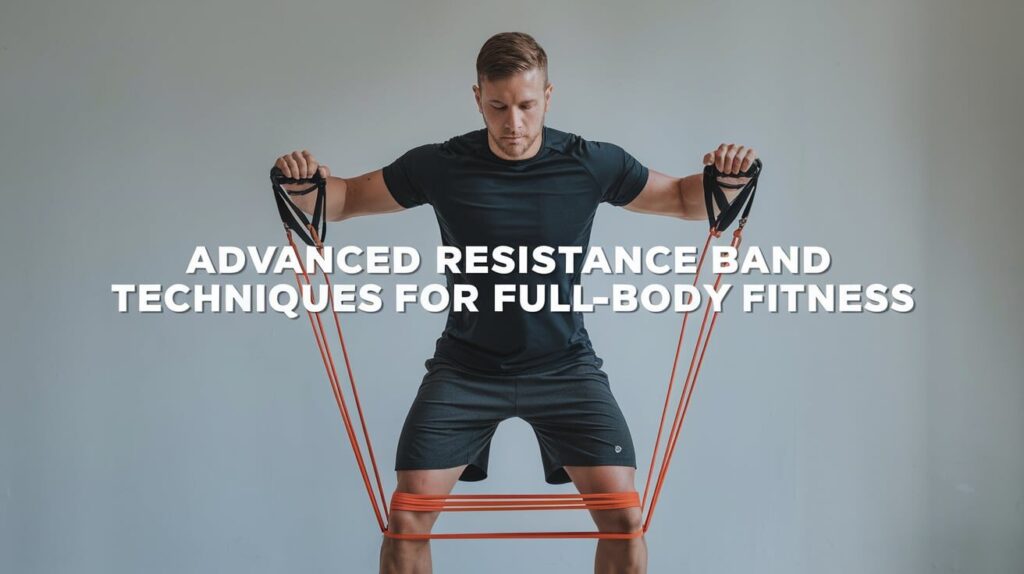
Troubleshooting Common Resistance Band Issues
Adding home workouts and workout variety to our routine can help us reach our fitness goals. Yet, we might face problems like slippage and finding the right tension with resistance bands. By solving these issues, we can make our workouts better and get the most out of this flexible tool.
Dealing with Band Slippage
Slippage is a common issue with resistance bands. To avoid it, we need to hold the band securely and place it correctly. Using non-slip surfaces or anchors, like door frames or sturdy furniture, can help keep the band in place. Also, trying out specialized grip options, like handles or gloves, can give us a better grip and reduce slippage.
Adjusting Tension for Best Results
Finding the right tension is key for a good resistance band workout. We can change the band’s placement, adjust our grip, or use different resistance levels to keep the challenge right. Try different tension levels to find what works best for your fitness level and the muscles you’re targeting.
| Resistance Band Type | Resistance Level | Suitable for |
|---|---|---|
| Regular Loop Bands | Light to Medium | Beginners, Rehabilitation, Mobility |
| Mini Bands (Rubber and Fabric) | Light to Heavy | Hip and Glute Exercises, Warmups |
| Tube Bands With Handles | Medium to Heavy | Strength Training, Full-Body Workouts |
| Flat Bands | Light to Extra Heavy | Versatile, Suitable for All Levels |
| Figure 8 Bands | Medium to Extra Heavy | Compound Exercises, Strength Training |
By tackling these common resistance band problems, we can create a safe and effective home workout space. This allows us to fully engage with our workout variety and reach our fitness goals.
“Resistance band training can be a game-changer for our fitness journey, but it’s important to address any issues that arise to get the most out of this versatile tool.”
Progressing in Resistance Band Training
As we explore resistance band training, the key to progress is increasing the challenge and tracking our fitness. By enhancing the resistance and monitoring our performance, we unlock more Strength Training and Muscle Building benefits.
Increasing Resistance Intentionally
To increase the challenge in our workouts, we can try several methods. Upgrading to stronger bands, adjusting anchor points, or combining multiple bands can help. These changes stimulate muscle growth and strength.
Research by Anderson et al. (2008) shows variable resistance training with bands improves strength and muscle. A study by Wallace et al. (2006) found adding resistance bands to bench pressing boosts peak force output.
Tracking Our Fitness Progress
- Monitoring the number of repetitions and sets we can complete with a particular resistance level
- Noting the perceived exertion during our workouts to gauge our effort and progress
- Measuring key body metrics, such as waist and hip circumference, to track changes in our physique
- Capturing progress photos to visually document our transformation
Tracking our performance and physical changes helps us set goals and celebrate milestones. Personal trainer Lisa Martinez advises listening to our bodies, taking rest days, and gradually increasing workout intensity.
| Metric | Initial Measurement | Current Measurement | Progress |
|---|---|---|---|
| Waist Circumference | 34 inches | 32 inches | 2 inch reduction |
| Shoulder Press Reps (with 20lb band) | 12 reps | 18 reps | 6 rep increase |
| Perceived Exertion (1-10 scale) | 8 | 6 | 2 point decrease |
By embracing progressive resistance band training and tracking our progress, we can reach our full potential. This versatile fitness tool offers many benefits.
“Resistance band workouts offer benefits such as improved bone density, enhanced flexibility, better posture, increased cardiovascular health, and mental clarity improvements.”
– Fitness Coach Lisa Martinez
Final Thoughts on Resistance Band Training
Resistance band training is powerful. It’s key to be consistent in our workouts. Even 15-20 minutes a day can make a big difference in strength, flexibility, and health.
By making resistance band training a regular part of our lives, we see steady progress. This progress is a result of consistent effort and dedication.
Staying Consistent with Our Routine
Unlocking resistance band training’s full potential requires making it a habit. We can do this by adding home workouts or using resistance bands on the go. Regular practice is essential.
Setting aside time each day or week for these exercises helps. It makes resistance band training a big part of our lives.
The Future of Resistance Training
The fitness world is always changing. We’ll see more use of resistance bands with new technologies and methods. This will bring more variety and options for everyone.
Resistance bands make working out easy and flexible. They’re perfect for our busy lives. This means we can reach our fitness goals more easily and with more flexibility.
Frequently Asked Questions
What are the main benefits of using resistance bands?
Resistance band training is flexible and helps enhance muscle strength, improve flexibility and mobility, and increase cardiovascular endurance. They work by creating constant tension, which aids muscle growth and strengthening. They are suitable for beginners and ideal for at-home and travel workouts.
How do I choose the right resistance band for my workout?
Resistance bands come in different strengths. To choose the right one, start with a lighter band and move to a harder one as you get stronger. Popular options include loop bands, tube bands with handles, and therapy bands, which target various muscle groups.
What are some advanced exercises for the upper body using resistance bands?
Advanced upper body techniques include Band Pull-Aparts, which target muscles between the shoulder blades to enhance posture and back strength, and the Overhead Press for strengthening the deltoids and improving shoulder shape. These add variety and challenge for muscle building.
How can resistance bands improve my lower body workouts?
Resistance bands are effective for the lower body, used in exercises like Spanish Squats to work quads harder and reduce knee stress, and Lateral Band Walks to strengthen hip abductors and improve stability. They help build muscle, improve flexibility, and boost lower body fitness.
How do resistance bands help strengthen the core?
Adding resistance bands to core exercises makes movements harder, working your abs in new ways and boosting overall strength and stability. Examples include the Seated Band Twist for obliques and Planks with band resistance to test the core's stability under extra load.
Can I do a full-body workout with resistance bands?
Yes, resistance bands are great for full-body workouts at home or while traveling. You can use circuit training with different band levels, including exercises like thrusters, rows, and squats. Adding plyometric movements with bands, like band-assisted broad jumps, can also create a challenging full-body routine.
How can I progress or make my resistance band workouts more challenging?
To progress, you can increase the challenge by upgrading to stronger bands, adjusting anchor points, or combining multiple bands. Tracking your fitness by monitoring reps/sets, perceived exertion, and physical metrics helps you gauge progress and set new goals.
